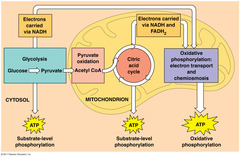Cell Respiration - AP Biology Flashcards
Terms : Hide Images [1]
| 5486457512 | Cellular Respiration | The process by which cells break down organic molecules and use an electron transport chain to produce energy (ATP) C6H12O6 + 6O2 --> 6 CO2 + 6H2O + energy (oxidative process) |  | 0 |
| 5486457513 | ATP | Consists of adenosine plus 3 phosphates; source of immediate energy for all cells (recognize this structure) |  | 1 |
| 5486457514 | Glycolysis | The first stage in cellular respiration or fermentation that splits glucose into 2 molecules of pyruvate - Occurs in cytoplasm (cytosol) - Is anaerobic (does not require oxygen) | 2 | |
| 5486457515 | Fermentation | Partial degradation (break down) of sugars in the absence of oxygen -Does not release much energy -End products are alcohol or lactic acid | 3 | |
| 5486457516 | Aerobic Respiration | Break down of organic fuel in the presence of oxygen - Consists of Krebs cycle and electron transport chain (ETC) and oxidative phosphorylation - Occurs in the mitochondria |  | 4 |
| 5486457517 | Citric Acid Cycle | Synonym for Krebs Cycle | 5 | |
| 5486457518 | Anaerobic Respiration | Synonym for fermentation | 6 | |
| 5486457519 | Aerobic | With oxygen | 7 | |
| 5486457520 | Anaerobic | Without oxygen |  | 8 |
| 5486457521 | Krebs Cycle | The second step in cellular respiration which involves many chemical steps to convert acetyl CoA to carbon dioxide - Occurs in the mitochondrial inner matrix - Turns twice for each molecule of glucose - also known as Citric Acid Cycle | 9 | |
| 5486457522 | Acetyl CoA | Acetyl coenzyme A which combines with pyruvate from the first step in respiration; raw material of Krebs cycle | 10 | |
| 5486457523 | ATP synthase | An enzyme that produces ATP as protons (H+) flow down a gradient through chemiosmosis or oxidative phosphorylation |  | 11 |
| 5486457524 | Electron Transport Chain (ETC) | Electrons flow down a sequence of electron carrier molecules (chain) in a series of redox reactions that release the energy used to make ATP |  | 12 |
| 5486457527 | Chemiosmosis | An energy coupled process that uses the energy released as protons flow down a proton gradient to synthesize ATP - In the presence of oxygen (aerobic), most ATP synthesis in cells occurs by chemiosmosis |  | 13 |
| 5486457528 | Substrate-Level Phosphorylation | Process by which an enzyme transfers a phosphate from a susbtrate directly to ADP, forming ATP |  | 14 |
| 5486457529 | Oxidative Phosphorylation | The third major stage in cellular respiration; the production of ATP using energy from the electron transport chain (ETC) |  | 15 |
| 5486457532 | NAD+/NADH | One of the most important coenzymes in the cell that acts as an electron carrier - NAD+ traps electrons from glucose and is reduced (gains electrons) to become NADH - When NADH transfers its electrons to the ETC, it is oxidized (loses electrons) to become NAD+ | 16 | |
| 5486457533 | FAD/FADH2 | Secondary electron transporter to the ETC from the Krebs cycle, entering at lower energy levels than NADH | 17 | |
| 5486457534 | Redox Reactions | Reduction and oxidation reactions due to the transfer of one or more electons |  | 18 |
| 5486457535 | Reduction | Gain of electrons; gain of hydrogen -> for storing energy |  | 19 |
| 5486457536 | Oxidation | Loss of electrons; loss of hydrogen -> for releasing energy |  | 20 |
| 5489328523 | Proton-Motive Force | The potential energy stored in the form of a proton electrochemical gradient, generated by pumping hydrogen ions (H+) across a biological membrane during chemiosmosis | 21 | |
| 5489962976 | Pyruvate | The 3-carbon sugar that is the product of splitting glucose in glycolysis (the first stage of cellular respiration) - sometimes called pyruvic acid | 22 |
